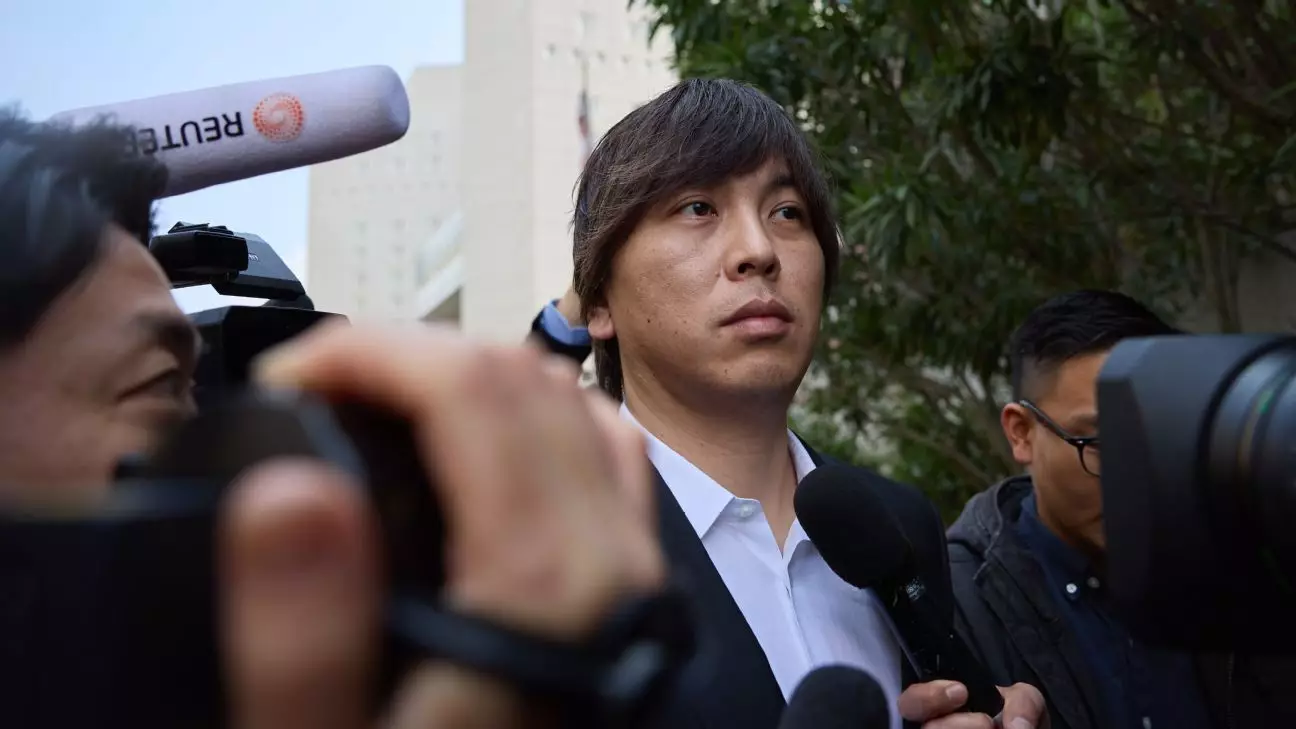In a recent legal controversy, federal prosecutors have responded to claims made by Ippei Mizuhara, Shohei Ohtani’s former interpreter, who alleged that his actions—specifically, stealing substantial sums from the baseball star—were fueled by a gambling addiction. Mizuhara faces sentencing after pleading guilty in June, and he is seeking a significantly reduced sentence of 18 months. However, prosecutors have firmly backed their original recommendation of a nearly five-year prison term, bolstered by evidence disputing Mizuhara’s narrative. The unfolding case not only highlights the complexities of gambling addiction but also raises pressing questions about personal accountability among those in positions of trust.
Mizuhara’s assertion of a long-standing gambling addiction marks a poignant turn in the legal proceedings. He claims to have frequented casinos multiple times a week, a point he emphasized in his plea for leniency. Nevertheless, federal investigators refute his claims, stating that their thorough investigation found little evidence to substantiate Mizuhara’s defense. In fact, their findings reveal a stark contrast between Mizuhara’s claims of continuous gambling and the minimal evidence of his gambling activity, dating back primarily to an isolated instance in 2008.
The prosecution’s insistence that Mizuhara’s statements are self-serving emphasizes the crucial role that credibility plays in legal proceedings. Prosecutors noted that “all defendants claim to be remorseful,” questioning whether Mizuhara’s regret stems from genuine contrition or simply from the consequences of his actions being laid bare. A crucial element of their argument is the idea that admitting guilt does not equate to true accountability, especially when the evidence appears to contradict the defendant’s narrative.
This highlights a broader societal dilemma—how does one measure accountability in cases involving betrayal of trust? Mizuhara, who had a front-row seat to the life of a major league star, held a position that necessitated a high degree of integrity, and his betrayal raises significant ethical questions. At the core of the prosecution’s assertions is the claim that Mizuhara’s gambling habits were not desperate enough to justify his decision to exploit Ohtani financially.
In considering Mizuhara’s financial behavior, prosecutors provided evidence indicating that he often had substantial funds at his disposal, undermining claims that he was struggling financially as a justification for his thefts. Records revealed that at the time of the initial fraudulent wire transfer—a relatively modest sum of $40,000—Mizuhara boasted over $34,000 in his checking account. This raises critical questions about his decision-making process and the rationale behind choosing to siphon funds from Ohtani rather than utilizing his personal resources.
The specifics of Mizuhara’s financial activities further complicate the narrative. Prosecutors pointed out that he not only had access to significant funds but also leveraged Ohtani’s debit card without the star’s knowledge. This suggests not only a lack of respect for the trust afforded to him by Ohtani but also a conscious decision to prioritize self-interest over ethical conduct. The existence of substantial bank balances and a Porsche gifted by Ohtani stand in stark contrast to Mizuhara’s claims of financial distress.
As the prosecution delves deeper, the pattern of Mizuhara’s choices becomes increasingly illuminating. They revealed that Mizuhara participated in sports betting after he had already committed acts of theft, challenging the narrative that he was in dire financial straits due to gambling debts. His involvement with betting platforms such as FanDuel and DraftKings raises questions about his understanding of risk versus reward and whether he genuinely viewed these platforms as avenues for rectifying his financial issues—or simply as a further means to exploit Ohtani’s finances.
Additionally, documents submitted by the prosecution hint at Mizuhara’s reluctance to accept professional opportunities that could have mitigated his financial burden, suggesting a troubling disconnect between his actions and the opportunities presented to him. By refusing to engage in commercial deals—encouraged by Ohtani—Mizuhara seems to indicate either a misguided sense of pride or a deeper underlying issue regarding his financial behavior.
As the Feb. 6 sentencing date approaches, the case of Ippei Mizuhara serves as an important reminder of the complexities surrounding financial misconduct and personal accountability. While Mizuhara’s arguments for leniency rest upon claims of addiction and regret, the prosecution’s counters paint a different picture—one of manipulation, betrayal, and ethical failure.
This unfolding narrative speaks not only to the specific circumstances surrounding Mizuhara and Ohtani but also raises broader issues about trust and integrity within professional environments. It urges a conversation about the consequences of financial impropriety and the imperative for individuals in positions of trust to maintain ethical standards. Ultimately, the repercussions of this case will ripple beyond the courtroom, influencing perceptions about trustworthiness and accountability in professional landscapes.

